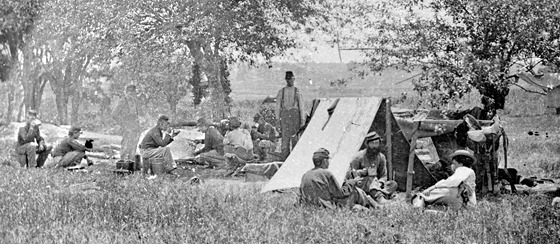July 13th.—Halcott Green came to see us. Bragg is a stern disciplinarian, according to Halcott. He did not in the least understand citizen soldiers. In the retreat from Shiloh he ordered that not a gun should be fired. A soldier shot a chicken, and then the soldier was shot. “For a chicken!” said Halcott. “A Confederate soldier for a chicken!”
Mrs. McCord says a nurse, who is also a beauty, had better leave her beauty with her cloak and hat at the door. One lovely lady nurse said to a rough old soldier, whose wound could not have been dangerous, “Well, my good soul, what can I do for you?” “Kiss me!” said he. Mrs. McCord’s fury was “at the woman’s telling it,” for it brought her hospital into disrepute, and very properly. She knew there were women who would boast of an insult if it ministered to their vanity. She wanted nurses to come dressed as nurses, as Sisters of Charity, and not as fine ladies. Then there would be no trouble. When she saw them coming in angel sleeves, displaying all their white arms and in their muslin, showing all their beautiful white shoulders and throats, she felt disposed to order them off the premises. That was no proper costume for a nurse. Mrs. Bartow goes in her widow’s weeds, which is after Mrs. McCord’s own heart. But Mrs. Bartow has her stories, too. A surgeon said to her, “I give you no detailed instructions: a mother necessarily is a nurse.” She then passed on quietly, “as smilingly acquiescent, my dear, as if I had ever been a mother.”
Mrs. Greenhow has enlightened Rachel Lyons as to Mr. Chesnut’s character in Washington. He was “one of the very few men of whom there was not a word of scandal spoken. I do not believe, my dear, that he ever spoke to a woman there.” He did know Mrs. John R. Thompson, however.
Walked up and down the college campus with Mrs. McCord. The buildings all lit up with gas, the soldiers seated under the elms in every direction, and in every stage of convalescence. Through the open windows, could see the nurses flitting about. It was a strange, weird scene. Walked home with Mrs. Bartow. We stopped at Judge Carroll’s. Mrs. Carroll gave us a cup of tea. When we got home, found the Prestons had called for me to dine at their house to meet General Magruder.
Last night the Edgefield Band serenaded Governor Pickens. Mrs. Harris stepped on the porch and sang the Marseillaise for them. It has been more than twenty years since I first heard her voice; it was a very fine one then, but there is nothing which the tooth of time lacerates more cruelly than the singing voice of women. There is an incongruous metaphor for you.
The negroes on the coast received the Rutledge’s Mounted Rifles apparently with great rejoicings. The troops were gratified to find the negroes in such a friendly state of mind. One servant whispered to his master, “Don’t you mind ’em, don’t trust ’em” —meaning the negroes. The master then dressed himself as a Federal officer and went down to a negro quarter. The very first greeting was, “Ki! massa, you come fuh ketch rebels? We kin show you way you kin ketch thirty to-night.” They took him to the Confederate camp, or pointed it out, and then added for his edification, “We kin ketch officer fuh you whenever you want em.”
Bad news. Gunboats have passed Vicksburg. The Yankees are spreading themselves over our fair Southern land like red ants.





